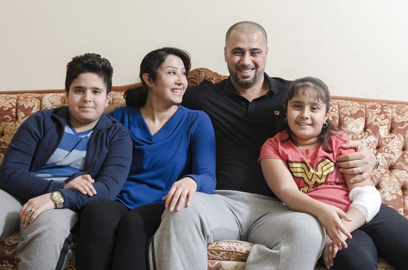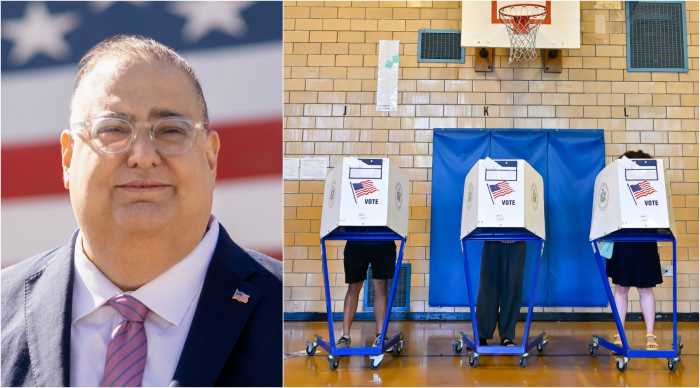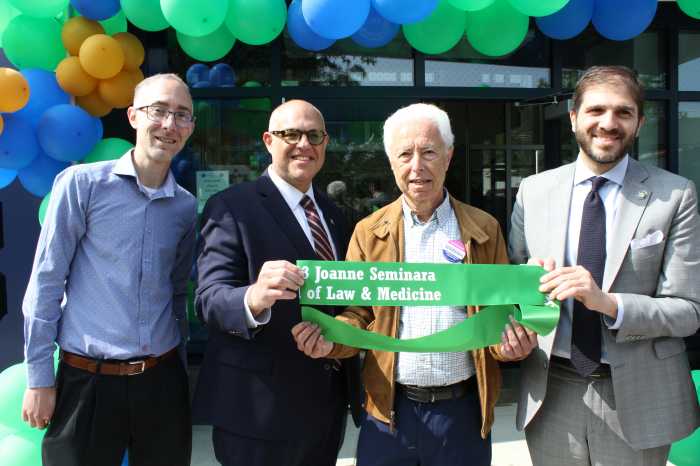This clan went from Iraq to Ridge.
A family of Iraqi refugees who fled Baghdad amid death threats from terrorists targeting the father’s work supporting the American army built a new life in Bay Ridge with the support of a Downtown group that helps immigrants and refugees resettle. The family is thankful to finally live in security, but said they never expected to upend their lives to start over in a new country, according to the mother.
“We thought maybe we’d come to the U.S. on a trip, but living here and settling, no,” Najlaa Alani said through a translator. “We weren’t thinking about that.”
Alani and her husband Husam Sano finally arrived in the U.S. in February 2014 with their kids, 12-year-old Aymen and 7-year-old Aya, but the couple started to consider fleeing Iraq in 2005 — the same year he and Alani got married — when Sano started receiving death threats while he was working for the U.S. Army as a technology contractor at a base called Camp Taji.
The year before, many Iraqis working with the U.S. government — including Sano’s own driver — were murdered by Al-Qaeda, leading Sano to take seriously the threats demanding that he leave his job supporting American troops.
“At that time, people who were doing these things was Al Qaeda,” he said.
Soon after, Alani began receiving threats as well, and after a relative saw an armed man searching for Sano, his bosses advised him to leave the country, at least temporarily.
The couple fled to Syria at the end of 2005 to live with Alani’s parents, but returned to Iraq about a year later, where Alani gave birth to Aymen. Aya was born in 2009, the same year Sano applied with the International Organization for Migration to bring his family to the U.S.
After a three-year wait, the organization expedited the process when the terrorists demanded Sano leave his new job with the U.S. State Department, calling it his “last warning.”
Finally, in February 2014, the organization told the family they had tickets to fly to the U.S. in just three weeks, leaving them scrambling to prepare to flee and having to abandon most of their possessions.
“My life and my family’s security is important, but it was a small period of time — we left most of our stuff, we couldn’t sell anything,” Sano said.
But with the help of the Downtown Arab American Family Support Center and its director of community outreach and prevention support, Ahmed Mohammed — who translated the immigrants’ interview with this reporter — the family found an apartment and Sano got a job within two weeks of arrival.
The group recently helped the family finish paying off the $5,700 in airfare fees — since all refugees have to repay their travel costs to the U.S. State Department — with the help of its New Immigrants and Refugees Fund, which it launched last July. In addition to helping reimburse the U.S. government for bringing refugees into the country, the fund helps refugees once they get here with mental health services, English courses, and job training.
The greatest challenge the family faced initially was the language barrier, since they didn’t know any English. Aymen struggled so much in school that his parents even considered returning the family to Iraq before deciding it was just too dangerous.
“We felt an emptiness, but when we put in our mind the danger that might face our two kids back in Iraq, we said, ‘we must stay for our kids,’ ” Sano said.
For about a year, Alani often stayed up all night translating her second-grade son’s homework into Arabic until he had a grasp on English — which he said finally helped him feel confident to experience all that his new country had to offer.
“When I learned it and mastered it, I didn’t feel very scared here,” Aymen said. “I felt like there were places to explore, fun to have, foods to try.”
Aymen is a big fan of burgers, pizza, and sushi, he said, adding that he enjoys science class in school and playing on the hockey team, and wants to be a doctor when he grows up. His younger sister, Aya, favors cheese pizza and soccer, and wants to be a teacher, she said.
Alani also learned English, taking courses for 15 months — with the help of financial aid — at the Metropolitan Learning Institute in Sunset Park, and wants to study to become an X-ray technician. Sano is two months into his three-month English program, which he juggles with working six days a week as the chef at an Arab bakery on Fifth Avenue — a job he’s grown to love.
“Right now, I’m beginning to love my job, because I’m liking what I’m doing,” he said, adding that he hopes to start management classes soon and one day work for the U.S. government again.
The family enjoys their new neighborhood, but are now hoping to get Alani’s family to come to the U.S., because their new life feels incomplete without them.
“This is the only thing that we miss, actually — our family,” said Sano.
You can donate to the Arab American Family Support Center to help Sano’s family and others like them here.

























